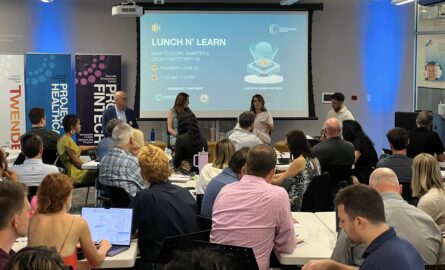For 10 years, the Nashville Entrepreneur Center (NEC) has been the “front door” to entrepreneurship in our city, making Nashville the best place in the country to start and grow a business.
In the “Power of 10” blog post series, we’re telling the story of the Nashville Entrepreneur Center through the eyes of the entrepreneurs who built it. These 10 interviews will explore the history of the EC, and the impact it’s had on the community, building a strong foundation of entrepreneurship that made Nashville the city it is today. This is the seventh of 10 posts in this series; check back soon for more!
Native Nashvillian Mike Shmerling wasn’t always interested in entrepreneurship. Born on Church Street, he started his career 43 years ago in accounting, but by his 30s, he made the leap into entrepreneurship and in 2007 was invited to co-chair an initiative for an entrepreneurial hub in Nashville. The idea was to build the Nashville entrepreneurial community; Healthcare, music, hospitality, and tech were booming by then, but Nashville was more than just a business hub — it had a reputation for helping others and collaborating.
The initiative committee had one goal in mind for this new nexus: To make entrepreneurship inclusive for all industries, ideas, and people. “From the very beginning, the idea was to open the door, open the windows, open everything to specific populations that might not have been able to go into business ownership, starting companies, growing businesses, creating wealth, historically. It represents a lot more groups than it doesn’t represent. We said ‘there’s a void’ and that needs to change,” Mike said. They had to know who to serve and how to do it best.
“How do we keep from failing?” That was the question that lingered in the air for Mike and the team that chaired the Nashville Entrepreneur Center in its early days. After bringing the NEC to the Trolley Barns, Mike began focusing on incentivizing the venture capital community to join the idea. It was an uphill battle. Risk-averse Nashville investors were hesitant to support the organization, which relied heavily on the city’s young startups. However, investors from other cities began taking notice of Nashville, even while locals were anxious to get involved.
“One venture capitalist from New York, ‘What’s really unusual about Nashville is that you take phone calls in Nashville. People actually return your phone calls in Nashville … That’s very strange. I very rarely return phone calls in New York… It was as much about the culture here as it was anything else.”
It was that attention that motivated the Nashville investor community, building an investment environment was particularly attractive because of its culture of helping others.
And one of those investors was Mike. While he was working on building Nashville’s entrepreneurial ecosystem, Mike was also participating in it as an entrepreneur; he had started and sold eight businesses, and was encouraged to continue to give back to the community because he was inspired by the tenacity of the younger generation. “There is a certain amount of inspiration that you get from younger generations who have ideas and want an opportunity and that appreciate the value that maybe somebody who has done that several times or one time can bring to them.”
Mike prides himself on being an investor but stresses the many different roles that mentors can play for a business through the entirety of the entrepreneurial life cycle, from the first inception of a business idea, to selling the business and starting all over again. “There’s lots of different roles people can play in this area. The entrepreneur center is fundamental to that because it gives a channel, regardless of where you fit in the food chain of investing or helping with small business, early-stage companies …there’s a way to channel that energy.”
Most of all, Mike is proud of the credentials of the NEC. “One of the most important things that the NEC can do is pay very close attention to and cherish the credential that they created. It means something, it stands for something. It’s like a college or graduate degree from somewhere…There’s entrepreneur centers everywhere, this one is special. This one has had some phenomenal alumni, great outcomes and a lot of commitment from a lot of people that have been there from day one.”
He truly believes investors can give back to the community and share knowledge. Proud of the strides the NEC has made, Mike is excited about the opportunity to continue giving back. “If we don’t keep reinventing the way we do things, we go stale.”



